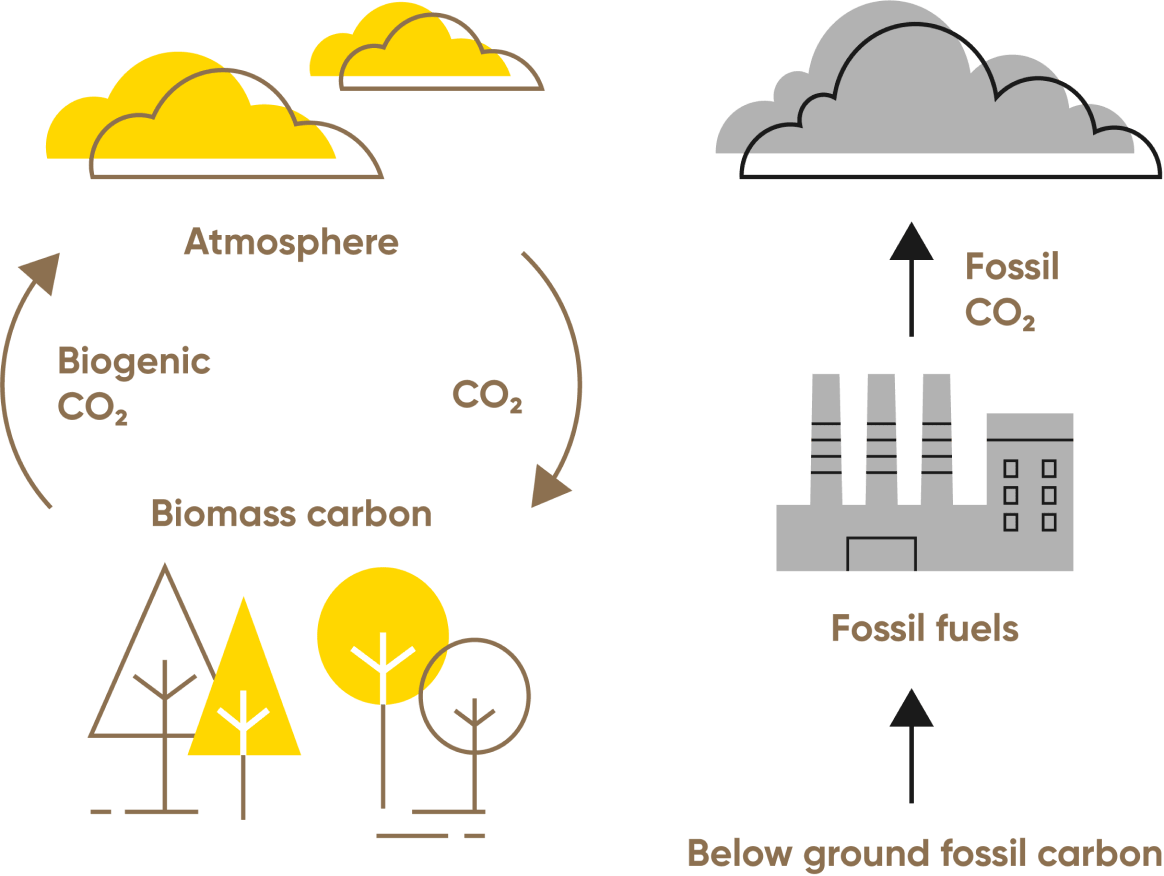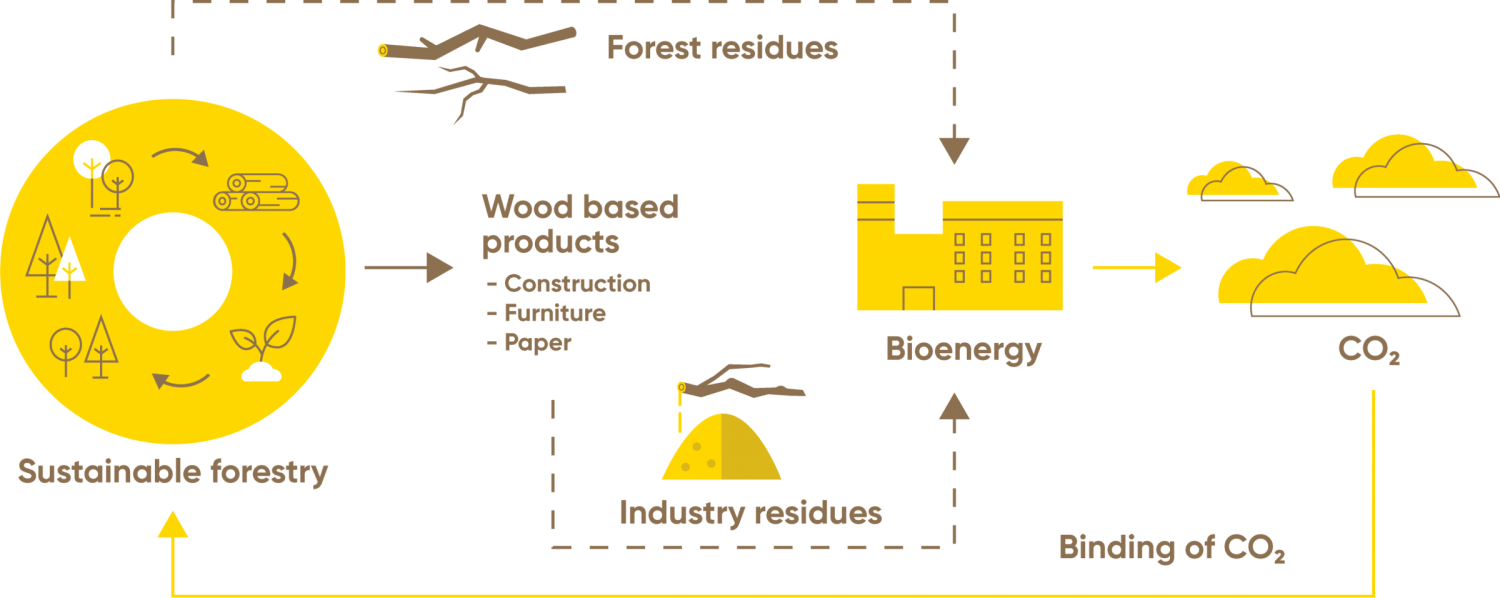





Biomass
Pellets are an environmentally friendly fuel

Pellets are an environmentally friendly fuel that can replace fossil fuels
As a solid biofuel, heating pellets are among the most flexible and efficient renewable energy sources.
Pellets are a high-energy heating material that can replace gas, oil, or oil shale. By burning fossil fuels, we are increasingly adding new carbon from the ground into the energy mix and boosting anthropogenic climate change. Any fossil material that we can leave in the ground is a step closer to solving climate problems.

If properly harvested and used, bioenergy is part of a balanced carbon cycle. Climate problems are linked to the imbalance of the atmospheric carbon cycle resulting from the use of fossil carbon. Carbon from bioenergy has a place in this balanced cycle, while carbon from fossil fuels does not.
The use of wood waste in energy production allows us to move towards meeting our climate goals by burning less oil, oil shale or natural gas. Sustainably produced wood-based biomass is an environmentally friendly energy source, provided that the raw material comes from the natural waste stream, does not compete in price or value with other industries and is produced with the least possible environmental impact. The energy produced from biomass meeting these criteria has a life-cycle emission reduction potential of up to 98% compared to coal and is indispensable for achieving climate goals.


We are a reliable pellet producer
Graanul Invest is one of the world’s leading and most reliable wood pellet producers with more than 20 years of experience developing bioenergy. Established in Estonia, the company has grown into an international group with 12 modern pellet plants – four in Estonia, six in Latvia, one in Lithuania and one in the United States. We are a reliable partner for local suppliers and forest owners as well as large international companies around the world. With an annual production capacity of 2.7 million tons, we are one of the largest pellet producers in Europe.
Wood pellets are an environmentally friendly biofuel sourced from the production residues of the forest and wood industries. Pellets are made from production residues of the wood industry (sawdust, wood chips) and low-quality roundwood that is not suitable for producing sawn timber or other wood products.
We are committed to maintaining a mass balance and ensuring that the amount of wood pellets sold with SBP claims does not exceed the amount of raw materials received.
We maintain individual mass balance accounting for each production plant and maintain information on all groups of raw materials. Our information on raw material assortments includes the country of origin of the biomass and data for GHG calculations, starting from the transport of the biomass from the harvesting site up to the production plant and product-specific GHG data.

Industrial and premium pellets
As a result of a multi-stage process containing no chemical additives, natural wood bulk granules with a diameter of 6 mm are formed while the material is sorted, crushed, dried and pressed. Wood pellets are convenient to use both in households and automated industrial systems.
Most of Graanul Invest’s production (98%) consists of industrial pellets exported outside the Baltic states. The main markets for industrial pellets are the United Kingdom, Denmark and the Netherlands. Industrial pellets are mainly used in power and cogeneration plants to produce energy and heat, replacing fossil fuels.
Premium pellets are a high-quality biofuel that can be used in automated pellet boilers for households. Our premium pellets are DINplus and ENplus® A1 certified. Being one of the largest pellet producers in Europe, we can guarantee volumes, security of supply and reliability.

Pellets are produced only from waste material
We produce wood pellets only from raw material left over from other industries – with no other application, it would otherwise remain unused. All the material used has undergone a cascade effect in terms of price, value and priority. This means that the wood used as raw material is of the lowest quality class (energy or firewood) and sold at the lowest price available on the market.
Sometimes such surplus material can also be low-quality roundwood – defective roundwood discarded by the wood industry because their length, curvature, damage, metal content or other defects do not meet the requirements of sawmills, plywood mills or the paper industry. According to the wood processing industry’s criteria, such timber has the lowest possible quality, affecting its value in terms of both the price and possible applications. This material has passed through the entire hierarchy of use, which means it has proved unusable in the material, construction, chemical or paper industry due to its physical properties, the location of the raw material or the saturated market.
All participants in the bioenergy market strictly adhere to and document the path through this hierarchy. It is the main requirement for biomass-based renewable energy production. Biomass producers undergo annual audits to verify the origin of the wood they use as raw material and the quantities of different classes of raw material used to the nearest ton. The material used in bioenergy is regulated by the Renewable Energy Directive (RED II), the requirements of which will remain in place until at least 2030. Unaudited raw materials and biomass do not qualify as renewable energy sources.
All the biomass used in bioenergy, including the material used to produce pellets, is a waste product of the normal activities of the current wood and forest industry. This material already existed as a surplus before the bioenergy trend emerged. More and more of it will likely be produced in the future, as the share of biomaterials in the construction and materials sectors gradually increase.

Efficient and modern production facilities
Constantly evolving, Graanul Invest’s production facilities are among the most advanced in the field. Digitized solutions make it possible to monitor the movement of material and control production processes to a high level of detail. 3D scanning of the raw material arriving at our factory gates allows us to identify all incoming raw material quickly and accurately, ensuring reliability and accuracy for all our partners.
In Graanul Invest’s pellet production value chain, greenhouse gas emission is significantly lower than the European pellet market average. We have achieved this through a combination of different efforts, but the cogeneration of electricity and heat using biomass has been the main driver.

Important employers in rural areas
All of our pellet plants are located away from major cities and are important employers in rural areas. Seizing regional opportunities and providing people with jobs close to home contributes to regional development and supports sustainable living in the countryside. Our goal is to support local communities and actively contribute to the development of life in the area.
Bioenergy also has a vital role in enabling rural areas in the Baltics to share in the development of wood processing technologies and maintain the opportunity to participate in the sector’s innovation as well as the rapidly expanding international market.
Bioenergy is part of the wood industry’s circular economy cycle, utilizing all waste product and creating value from low-quality wood.
















